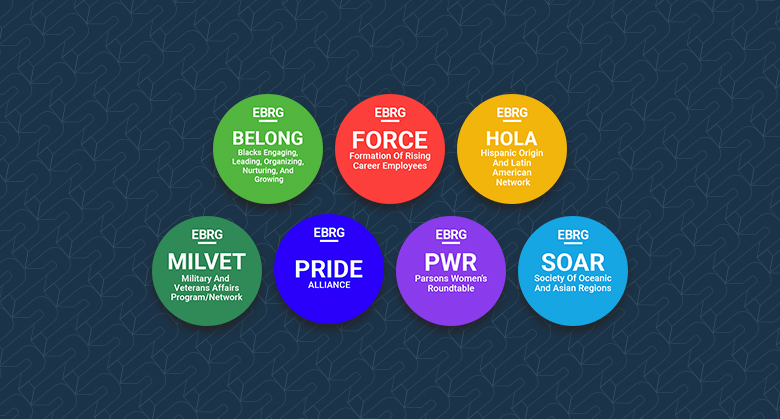
Workplaces around the world are striving to become more inclusive and diverse, resulting in employees from different backgrounds and cultures gaining platforms from which to share their experiences and perspectives. The snowball effect of that advancement is a growing understanding and appreciation for the differences among people, which empowers a boost in innovation and creativity, enabling the best possible ideas and solutions. When employees who are different from their coworkers in gender, ethnicity, physical ability, or sexual orientation feel safe to be their authentic selves and to speak freely and openly about their differences, they’re more likely to leverage those differences to offer viewpoints and skill sets that could improve their organization’s problem-solving proficiency and, ultimately, increase their success.
Here at Parsons, our efforts to foster a diverse and inclusive workplace have us envisioning a future that’s looking brighter than ever. By providing holistic development opportunities for diverse employees, by exploring generational awareness of complex DEI topics, and by recognizing the importance of intersectionality and how it affects employees in the workplace, we’re truly imagining next and looking to transform tomorrow for the better. And one key way we’re accomplishing that objective is through our employee business resource groups (EBRGs), which create safe places for employees to collaborate, be heard, and grow professionally to ensure a cooperative, inclusive work environment that maximizes innovation, produces world-class solutions, and grows the company.
So what is an EBRG, exactly? For that answer, we turn to Erica White-Dunston. Erica joined Parsons as our DEI director in 2022. She says, “I chose Parsons because its history in ethical behavior and its commitment to authenticity and fairness modeled the work environment I sought.” Erica, a highly credentialed graduate of Howard University, Syracuse University College of Law, and Regent University School of Divinity, is a strong adherent to Rev. Dr. Martin Luther King’s concept of the Beloved Community, driven by caring and compassion, which leads us back to EBRGs.
According to Erica, “EBRGs are groups created to help us better understand and create a collaborative relationship between the employees of that specific area of interest and/or background and the overall business. Each EBRG acts as a liaison between its members and the larger corporation to help marry the interests, goals, needs, and wants of the employees with the primary goals and needs of the organization.”
Currently, we have seven EBRGs:
- BELONG – Blacks Engaging, Leading, Organizing, Nurturing, and Growing
- HOLA – Hispanic Origin and Latin American Network
- RALLYPOINT (MILVET) – Military and Veterans
- PRIDE – LGBTQ+ Alliance
- PWR – Parsons Women’s Roundtable
- SOAR – Society of Oceanic and Asian Regions
- FORCE – Formation of Rising Career Employees
With each of these groups helping the company understand the perspectives of the people it represents, Parsons is better equipped to create various means of inclusion, belonging, and authenticity. In the corporate world, this signifies a transformation, Erica says, “to an organization that is value added rather than value fit.” She explains, “What I mean by that is prior to a real focus on diversity, equity, and inclusion, most organizations really focused on helping people figure out and fit into the organization’s culture. Our EBRGs help us imagine next and think more critically about authenticity. They provide greater opportunities for viewpoints of differing backgrounds, which means greater opportunities for innovation. And where you have greater opportunities for innovation, you have greater opportunities for business success.”
Collectively, Erica says the EBRGs and the larger DEI program focus on three important objectives: educate, elevate, and celebrate. “We look to educate about the cultural competencies, norms, normative values, perspectives, and behaviors. We elevate by bringing particular areas of concern to light for people who may not be aware. And we celebrate the overall connection of each group.” It sounds simple, but Erica points out that there’s a balance that must be maintained between identifying the cultural competencies and viewpoints of a specific group of people and showcasing the connectivity of that group with the larger community in an intersectional way.
One of the ways that balance is struck is through the wealth of activities conducted by the EBRGs and the DEI program. After drafting a strong strategic plan for each EBRG, Erica says the next step was creating a plethora of different opportunities, such as training initiatives, coaching opportunities that are supported by outside vendors, book reviews, and the use of LinkedIn Learning courses that focus on areas of interest specific to the different EBRG communities.
But what about those who may not be part of a community represented by an EBRG? Well, that’s where being an ally comes into play. Erica says, “Our EBRGs are open to everyone in the community. Participation is what we’d like to emphasize.” All are welcome to join, support, and learn more about any of the EBRGs and the great Parsons people they represent.
By educating, elevating, and celebrating diversity through our EBRGs and by evolving as the needs of our society shift, we’re imagining next, transforming workplace culture for the better, and enhancing innovation to deliver better solutions and capabilities than ever—all to build a brighter future for everyone.